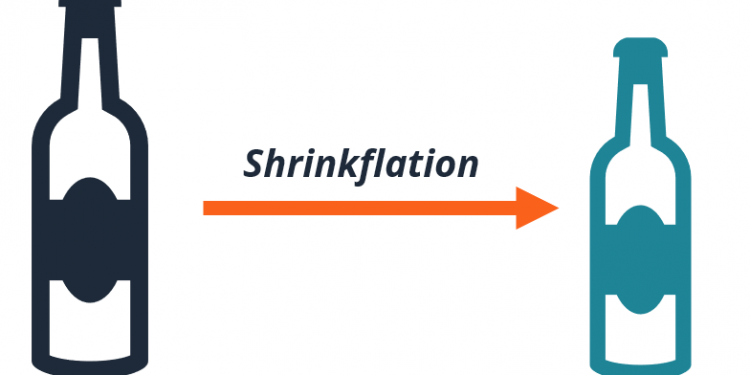Nigerians are suffering a shrinkflation, once again finding themselves at the receiving end of rising food prices and economic crunch.
A survey conducted by Nairametrics research reveals consumer goods companies are reacting to widespread inflation by adopting shrinkflation as a sales strategy.
Shrinkflation is the process of reformulating or decreasing the size or quantity of an item while its price remains the same. The word is the shrink-and-inflation portmanteau.
This strategy allows companies to boost their operating margin and profitability through lower expenses while maintaining sales volumes. Also, inflation indicators are associated with units of product volumes or weights, so then, shrinkflation may also affect the inflation rate in the Nigerian economy.
Consequently, unaltered pricing means that buyers are not made aware of the higher unit price of products, thereby giving them the illusion of consistency. This practice has a negative impact on consumers’ capacity to make informed purchasing decisions.
While some see shrinkflation as a “ripoff,” others see it as a profitable option for competing in a highly inflationary environment.
For the second consecutive month, Nigeria’s inflation rate declined further from 18.12% reported in April 2021 to 17.93% in May 2021. However, this decline has not been significant enough to reverse the worsened economic conditions in Nigeria. Exchange rate pressures, on the other hand, exacerbate the issue.
Shrinkflation is how some firms pass on their customers, higher manufacturing costs in a way that is often not visible. Since most manufacturing companies import raw materials, they may increase their participation in shrinkflation.
While for some companies it’s a strategy used to maintain profit margins, for others it’s the difference between survival and going under. Due to the heightened competition synonymous with consumer goods firms, they seem to be the most adopters of shrinkflation. To survive, some not only reduce the size but often do this in tandem with price increases.
For example, a pack of Coaster Biscuits had seven pieces, but more recently the number of pieces decreased, even as each piece grew thinner until the firm decided that three was plenty for its consumers. This change was followed by a price rise. Initially, a Coaster pack of seven pieces was offered for N5, but currently, there is a pack of 3 biscuits available for N10.
Speedy, Coconut Biscuit, Fish Biscuit, and Crackers are among the other brands that have implemented shrinkflation. These companies have likewise raised the pricing of their products.
The manufacturer of Burger peanut is effectively selling breeze to customers, who have dubbed it “airbag” because of the extra air within the pack. Titus Sardine is also on the list, having placed four pieces of fish in a tin and sold it for N200. For N500, the product now juggles between three and two pieces of fish. Even locally produced “fufu” has shrunk and finally become more expensive.
Companies favour the technique, as it is less obvious for discriminating customers. As opposed to price increases, the difference is generally minor or unrecognizable. Brands sometimes choose to shrink amid worries that price rise would lead to customers switching loyalties to competitors who keep their pricing even if their product sizes were decreased.
In a chat with FMCG distributor, Eyitemi Fasanu, she explained that shrinkflation is a common tactic employed by numerous companies over the years.
“In the past 4 years, I have seen Shrinkflation occur with Coca-Cola, Sardines, Newbisco Coaster Biscuits, Cereal, Gala Sausage Roll, Tomato Paste, Sachet Vegetable and Groundnut Oil and noodles, to mention a few,” Fasanu told Nairametrics.
She explained that shrinkflation may temporarily reduce the sales of the commodity before staging a comeback to elevate sales beyond previous levels.
“I noticed that this strategy shrank sales for a brief period at first, and the sales went back to normal and even increased leading to the derivation of the same level of satisfaction as before Shrinkflation, as more commodity was consumed. A good example is Indomie Noodles. This strategy frankly only pays the producer, and it works for the producer because of the high number of customers that are loyal to their brands,” she said.
Nairametrics also gathered from sources in the industry that most FMCG firms recalibrate their machinery solely for shrinkflation. They also indicated that the shrinking strategies led them to earn significantly better profits in times of economic crunch, as new pricing and package was passed for the original product, while the old product had decreased in its quality.
It’s also hard to prove it’s illegal making it tough for regulators to enforce reversals. This is perhaps why the response of the Federal Consumer Competition Protection Commission has been more of verbal acknowledgements than concrete actions to address the malaise.
It’s not ending soon
With the worsening economic conditions in Nigeria, shrinkflation may become more prevalent. While some perceive shrinkflation as a con, others see it as a market expedient way to compete in a high-inflation environment.
Ironically, while the inflation rate is captured at 17.93%, price increases for most consumer items have more than doubled as manufacturers attempt to adjust for inflation and deteriorating exchange rate situations.
Sadly, with the exchange rate situation worsening, it is unlikely that this will end anytime soon.








